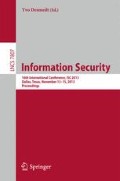Abstract
In order to analyze a variety of cryptosystems, Boneh, Boyen and Goh introduced a general framework, the Uber assumption. In this article, we explore some particular instances of this Uber assumption; namely the n-\(\mathsf {CDH}\)-assumption, the \(n^{th}\)-\(\mathsf {CDH}\)-assumption and the \(Q\)-\(\mathsf {CDH}\)-assumption. We analyse their relationships from a security point of view. Our analysis does not rely on any other property of the considered group and, in particular, does not use the generic group model.
Access this chapter
Tax calculation will be finalised at checkout
Purchases are for personal use only
Notes
- 1.
Remember that the oracle is stateless and thus not allowed to misbehave by counting the questions and giving an answer that depends on the position of the question. It would be easy to adapt to this case, but we have not considered it.
References
Abadi, M., Feigenbaum, J., Kilian, J.: On hiding information from an oracle. J. Comput. Syst. Sci. 39(1), 21–50 (1989)
Bao, F., Deng, R.H., Zhu, H.: Variations of Diffie-Hellman problem. In: Qing, S., Gollmann, D., Zhou, J. (eds.) ICICS 2003. LNCS, vol. 2836, pp. 301–312. Springer, Heidelberg (2003)
Barthe, G., Grégoire, B., Heraud, S., Béguelin, S.Z.: Computer-aided security proofs for the working cryptographer. In: Rogaway, P. (ed.) CRYPTO 2011. LNCS, vol. 6841, pp. 71–90. Springer, Heidelberg (2011)
Bellare, M., Rogaway, P.: The security of triple encryption and a framework for code-based game-playing proofs. In: Vaudenay, S. (ed.) EUROCRYPT 2006. LNCS, vol. 4004, pp. 409–426. Springer, Heidelberg (2006)
Biswas, G.: Diffie-Hellman technique: extended to multiple two-party keys and one multi-party key. IET Inf. Secur. 2(1), 12–18 (2008)
Blanchet, B.: Security protocol verification: symbolic and computational models. In: Degano, P., Guttman, J.D. (eds.) Principles of Security and Trust. LNCS, vol. 7215, pp. 3–29. Springer, Heidelberg (2012)
Boneh, D., Boyen, X., Goh, E.-J.: Hierarchical identity based encryption with constant size ciphertext. Cryptology ePrint Archive, Report 2005/015 (2005). http://eprint.iacr.org/
Boneh, D., Franklin, M.: Identity-based encryption from the weil pairing. In: Kilian, J. (ed.) CRYPTO 2001. LNCS, vol. 2139, pp. 213–229. Springer, Heidelberg (2001)
Boneh, D., Lynn, B., Shacham, H.: Short signatures from the Weil pairing. J. Cryptology 17(4), 297–319 (2004)
Boyen, X.: The uber-assumption family. In: Galbraith, S.D., Paterson, K.G. (eds.) Pairing 2008. LNCS, vol. 5209, pp. 39–56. Springer, Heidelberg (2008)
Burmester, M., Desmedt, Y.G., Seberry, J.: Equitable key escrow with limited time span. In: Ohta, K., Pei, D. (eds.) ASIACRYPT 1998. LNCS, vol. 1514, pp. 380–391. Springer, Heidelberg (1998)
Diffie, W., Hellman, M.E.: New directions in cryptography. IEEE Trans. Inf. Theor. 22(6), 644–654 (1976)
Feigenbaum, J., Fortnow, L.: On the random-self-reducibility of complete sets. In: Structure in Complexity Theory Conference, pp. 124–132 (1991)
Joux, A.: A one round protocol for tripartite Diffie-Hellman. In: Bosma, W. (ed.) ANTS 2000. LNCS, vol. 1838, pp. 385–394. Springer, Heidelberg (2000)
Maurer, U.M., Wolf, S.: Diffie-Hellman oracles. In: Koblitz, N. (ed.) CRYPTO 1996. LNCS, vol. 1109, pp. 268–282. Springer, Heidelberg (1996)
Menezes, A., Okamoto, T., Vanstone, S.A.: Reducing elliptic curve logarithms to logarithms in a finite field. IEEE Trans. Inf. Theor. 39(5), 1639–1646 (1993)
Shoup, V.: Lower bounds for discrete logarithms and related problems. In: Fumy, W. (ed.) EUROCRYPT 1997. LNCS, vol. 1233, pp. 256–266. Springer, Heidelberg (1997)
Young, A., Yung, M.: Relationships between Diffie-Hellman and “Index Oracles”. In: Blundo, C., Cimato, S. (eds.) SCN 2004. LNCS, vol. 3352, pp. 16–32. Springer, Heidelberg (2005)
Author information
Authors and Affiliations
Corresponding author
Editor information
Editors and Affiliations
Rights and permissions
Copyright information
© 2015 Springer International Publishing Switzerland
About this paper
Cite this paper
Joux, A., Rojat, A. (2015). Security Ranking Among Assumptions Within the Uber Assumption Framework. In: Desmedt, Y. (eds) Information Security. Lecture Notes in Computer Science(), vol 7807. Springer, Cham. https://doi.org/10.1007/978-3-319-27659-5_28
Download citation
DOI: https://doi.org/10.1007/978-3-319-27659-5_28
Published:
Publisher Name: Springer, Cham
Print ISBN: 978-3-319-27658-8
Online ISBN: 978-3-319-27659-5
eBook Packages: Computer ScienceComputer Science (R0)

